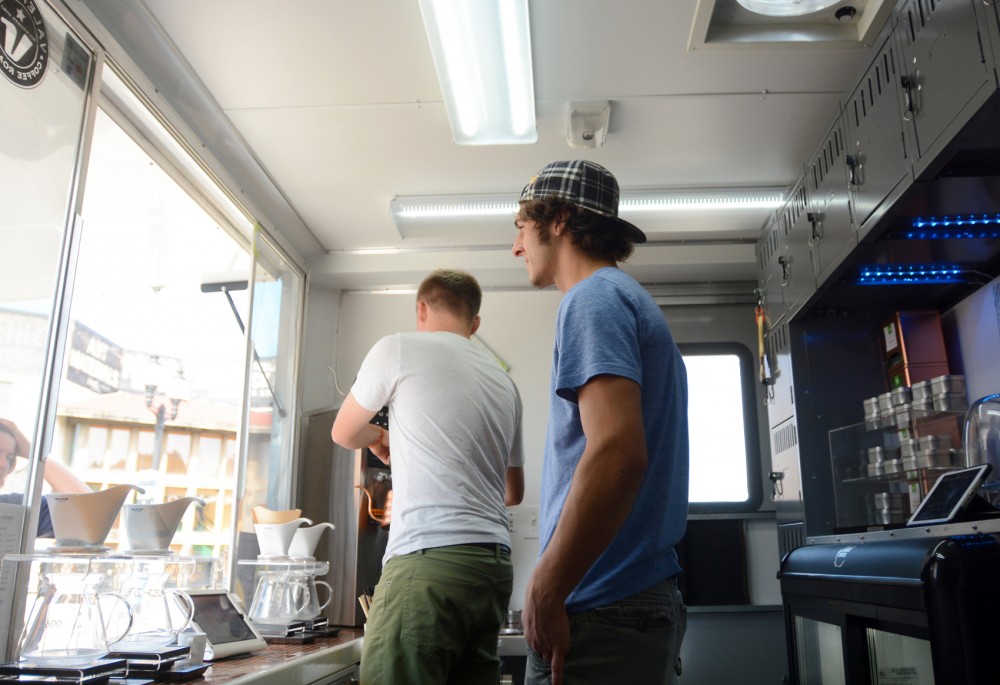Some business owners are using mobile establishments to sell their products amid the brick-and-mortar restaurants and cafes in Dinkytown near the University of Minnesota.
Other business owners in the area aren’t too fond of it.
Though city regulations make it difficult for food trucks to station their businesses within Dinkytown limits, some — like Misfit Coffee Co. — have found spots to park and sell.
A few owners of traditional stores in the area say the practice takes away their business, and they’ve discussed trying to ban it.
Existing city regulations state that food trucks are not allowed to park within 100 feet of another restaurant, which means setting up shop in Dinkytown can be a challenge, said Linda Roberts, manager of the city’s department of business licenses and consumer services.
Still, 100 feet down the street from Annie’s Parlour on 14th Avenue Southeast, Alex Boehm and Marcus Parkansky, co-owners of food truck Misfit Coffee Co., have been parking their establishment for the past two weeks.
Before picking the spot, Boehm said his co-owner sifted through city documents to make sure the location — on the bridge over the Dinkytown Greenway — was outside of the 100-foot legal requirement.
Though the coffee shop has an advantage over brick-and-mortar shops by being able to move from one place to another, Boehm said, stationary shops have their advantages, too.
“I’m not going to take a date, necessarily, [to a food truck], unless it’s a really good food truck,” Boehm said.
Some Dinkytown business owners, like Qdoba owner and Dinkytown Business Alliance Vice President Randal Gast, say they think brick-and-mortar restaurants in the neighborhood could lose business if food trucks park there regularly.
A coffee stand doesn’t directly compete with Gast’s restaurant, he said, but Misfit could set a precedent for other food trucks looking for a place to park in the future.
“The business community in Dinkytown would prefer to not allow it,” Gast said, adding that several Dinkytown business owners have expressed interest in banning the food trucks altogether.
No one has yet contacted the city’s licensing department concerning the controversy, Roberts said.
“We would definitely be willing to have a discussion with all involved,” she said.
Boehm said the mobile cafe doesn’t compete with area businesses because students prefer buying from the same shop on a regular basis, especially if those places offer seating. Because of that, Boehm said his group’s Dinkytown spot is less popular than other locations.
Recent DBA efforts to promote Dinkytown — which Gast said the food trucks did not contribute to — increased foot traffic through the area, he said.
Gast said he thinks the food trucks are unfairly taking advantage of the attention.
Alec Duncan, owner of Potter’s Pasties & Pies on Como Avenue Southeast, sells his food out of a brick-and-mortar storefront and three trucks. He said he thinks Dinkytown’s rules are too strict.
Duncan said it took him more than three years to get permission to operate one of his trucks on the
University campus on Church Street Southeast.
Both the mobile and stationary business models have expenses, the owners say. For food trucks, that includes gas, car maintenance and permits, Parkansky said. But the expense of owning a stationary business is much higher, Gast said.
“They have their life savings tied up in the trucks — I get it,” Gast said. “But somebody else has got their life savings, and maybe a five- to 10-year obligation because of the lease.”








